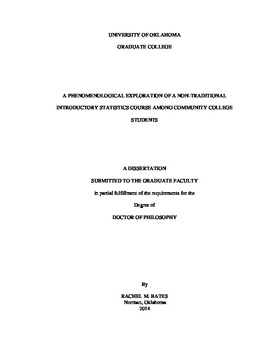| dc.description.abstract | Calls for comprehensive innovative curriculum and pedagogical changes to mathematics courses and introductory statistics courses have been documented within multiple national reports during the last several decades. In recent years, research studies in statistical education aimed at the teaching of introductory statistics have emerged in the literature (see, e.g., Cobb, 1993, Garfield, 1995, Hoaglin & Moore, 1992, Moore, 1997). In addition, the National Science Foundation (NSF) has funded numerous projects specifically designed to implement various aspects of statistics education reform (http://www.nsf.gov). The essence of the introductory statistics reform movement promotes statistical literacy and quantitative reasoning rather than calculations, procedures and formulae. Although there is a plethora of research on reform based statistics, there has been little research that describes the characteristics of a problem-based introductory statistics course at the college level or on how students respond to a more conceptually-based introductory statistics course.
The purpose of this study was to describe through a phenomenological approach, the following: the characteristics of a non-traditional introductory statistics course designed for undergraduate students, approaches to learning statistical concepts as the student engaged in problem-based learning activities and to focus on the perceived student learning experiences and emerging statistics understanding as a result of engaging in various problem-based learning activities within the course. In an effort to deepen the community college students' statistical development, this study sought to examine alternative pedagogical practices that required students to negotiate their prior knowledge and past experiences to construct and formulate new statistical knowledge. This study addressed the deficiency in literature regarding alternative pedagogical practices and problem-based learning within undergraduate level statistics courses. A study analyzing the relationship between students and their mathematical perspective benefits future and current educators as well as future higher education students. Understanding student's experiences and interactions with mathematics and statistics can offer insight into future curriculum development and pedagogical design. Considerable improvements in mathematics and statistics learning will not occur unless educators can succeed in transforming the way they are taught.
The results of this study offer important suggestions for PK-12 and post-secondary mathematics and statistics educators. The results of this study reveal first, that characteristics of this non-traditional introductory statistics course were consistent with the recommendations supported and outlined by the American Mathematical Association of Two-Year Colleges (AMATYC, 2006) and the Guidelines for Assessment and Instruction in Statistics Education (GAISE, 2012). Consequently, it is possible to design and implement undergraduate statistics courses that abide by the reform recommendations outlined by AMATYC (2006) and GAISE (2012). Additionally, the results of this study suggest that adopting such an approach has the potential to positively affect the teaching and learning of that course for the instructor and the students. As pointed out in the GAISE College Report (2012), “teachers of statistics should rely much less on lecturing and much more on alternatives such as projects, lab exercises, and group problem-solving and discussion activities'' (p. 9). Despite the persuasive evidence in cognitive science and education research, too many college-level students experience lecture-based forms of instruction in mathematics and statistics courses. As noted by Laursen, Hassi, Kogan, and Weston (2014), this failure limits the advancement of undergraduate mathematics education. Therefore, if steps are not taken to provide instructors with professional development opportunities and resources to implement in their own classes, the teaching and learning of statistics will remain stagnate and efforts for reform will be ideals of dreamers. It is then incumbent upon members of our profession to disseminate education and cognitive research and model the pedagogical strategies that support cognitive construction and align with the reform movements set forth by AMATYC (2006), GAISE (2012), and NCTM (2000).
Secondly, the student perceptions regarding the characteristics of this course revealed that the restrictive nature of the traditional lecture-based model hinders our students’ autonomous development. As mathematics educators, one of our goals is to develop our students’ problem solving skills. Mathematicians and statisticians are efficient, independent problem solvers because they have years of experience and developed skill sets that allow them to reason multiple possibilities before selecting an approach. For students, mathematics and statistics is most frequently experienced through series of computational procedures and memorized formulae because teachers routinely prevent intellectual development by demonstrating examples. The student perspectives in this study revealed that despite their initial need for external validation and request for step-by-step examples, they eventually grew more confident in their own knowledge and confident to try multiple approaches in order to obtain a reasonable explanation. | en_US |
